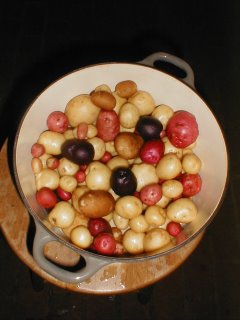Weeds for Supper

These weeds happen to be common food plants. Well, sort of. Not that many people have one pot with six different types of new potatoes. But for us, those are weeds. There are always some of the potatoes that don't get dug, and the next year they are the first to sprout. A ready source of the earliest new potatoes. Maybe you can identify the caribe, the all blue, the russet, the yukon, the cobbler, the all red, the whatever else in the photo.
One of the classic ways we fix these potatoes is in
Creamed New Potatoes with Green Garlic:
Boil up a pot of new potatoes until just fork tender. Drain.
For this pot I used about 3 or four cups of cream, probably half a cup of butter, about a cup of parmesan cheese -- all fresh and from our cow of course. And at least a cup of freshly chopped green garlic from the garden (also a "weed" left over from last year now that I think about it). Salt to taste.
Heat through, add some thickening (I prefer arrowroot).
What did we have this with? A pot of greens, a pot of black beans with a pork bone in it, a dish of raw salad greens from the garden, a big glass of milk, some ice tea. Everything except the black beans grown ourselves.
My mother used to make a rather classic peppered creamed new potato dish. And creamed new potatoes and green peas is also a classic.

5 comments:
sounds yummy. arrowroot, when can I get that?
it is like cornstarch except natural, whole. Any health food store will have powdered arrowroot. Used exactly like cornstarch -- mix first with some cold milk (or water) then add to hot cream over the potatoes and it will thicken it. That big a batch probably tood about 8-10 spoonfuls to thicken.
sounds good
Wow...these are beautiful! I haven't had much luck with unusual taters, but I'm inspired to keep trying.
I found your blog through the Appalachian web ring, and I'm enjoying reading your back issues. Pleased to find you.
Rebecca
And pleased to be found by you. But of course, I'm immediately wondering -- which are your "usual" taters (cause we probably grow those too -- kennebecs and cobblers, and pontiacs and yukons, are the most commonly available hereabout), and what kind of problems do you have, etc. Going now to check out your blog. See ya soon.
Post a Comment